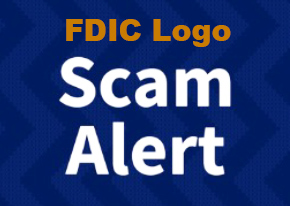 In the era of online banking and electronic transactions, ensuring the safety and security of your financial information is crucial. Unfortunately, scammers are constantly devising new strategies to manipulate unsuspecting individuals. One such scam involves the use of the FDIC logo to deceive people into sharing sensitive personal and financial details. In this article, we will delve into the FDIC logo scam and explore effective measures to protect yourself from falling victim to such fraudulent activities.
In the era of online banking and electronic transactions, ensuring the safety and security of your financial information is crucial. Unfortunately, scammers are constantly devising new strategies to manipulate unsuspecting individuals. One such scam involves the use of the FDIC logo to deceive people into sharing sensitive personal and financial details. In this article, we will delve into the FDIC logo scam and explore effective measures to protect yourself from falling victim to such fraudulent activities.
Understanding the FDIC Logo Scam:
The Federal Deposit Insurance Corporation (FDIC) is an independent agency of the United States government that safeguards depositors’ funds in case of bank failures. Scammers exploit the trust associated with the FDIC by leveraging its logo to dupe individuals into divulging confidential information, such as bank account details or social security numbers. These scams may involve a variety of communication channels, including emails, phone calls, letters, text messages, faxes, fraudulent websites, social media or phone calls to carry out their deceptive schemes.
1. Be Vigilant and Suspicious:
Maintaining a healthy sense of skepticism is paramount when dealing with any financial matter. Be wary of unsolicited calls, emails, texts, faxes, or messages that claim to be from the FDIC. Verify the legitimacy of the communication by cross-checking with your bank or directly contacting the FDIC through their official channels.
- The FDIC DOES NOT send unsolicited correspondence asking for money or sensitive personal information, and we’ll never threaten you.
- No government agency will ever demand that you pay by gift card, wiring money, or digital currency.
- The FDIC would never contact you asking for personal details, such as bank account information, credit, and debit card numbers, social security numbers, or passwords.
2. Do Not Share Personal Information:
Never share your personal or banking information, such as bank account numbers, social security numbers, or login credentials, with anyone unless you have verified their identity.
3. Verify Website Authenticity:
Scammers often create fake websites that mimic the FDIC’s official site. Check the URL for any discrepancies, such as misspellings or unusual domains. Look for the lock symbol in the address bar denoting a secure connection. Avoid clicking on suspicious links received via email or text messages.
4. Strengthen Online Security:
Protect yourself by maintaining robust cybersecurity practices. Use unique and complex passwords for all your online accounts, including banking logins. Enable two-factor authentication whenever possible. Regularly update and patch your operating system, browser, and antivirus software to guard against vulnerabilities.
5. Educate Yourself:
Stay informed about the latest scams targeting the financial sector and educate yourself about common tactics employed by scammers. Regularly visit the FDIC’s official website or subscribe to their newsletters to receive updates on current fraud risks and preventive measures.
6. Report Suspicious Activities:
If you encounter a potential scam or have fallen victim to one, report it immediately to your bank and the appropriate authorities. Contact the FDIC’s Consumer Assistance and Support Desk at 1-877-ASK-FDIC (1-877-275-3342), Monday – Friday, 8 a.m. to 8 p.m. (EST), or file a complaint through their website. Reporting such incidents helps to protect yourself as well as prevent others from falling prey to these scams.
Conclusion:
Financial scams exploiting the FDIC logo can have severe repercussions on your financial well-being, as well as compromise your personal information. By adopting a cautious approach, being vigilant, and staying informed, you can significantly reduce the chances of falling victim to such scams. Remember, protecting yourself from scams is a continuous effort that requires ongoing awareness and active response. Safeguard your finances by arming yourself with knowledge and taking the necessary precautions.
If you, your business associates, or your clients require a private investigator or forensic accountant regarding any type of fraud, please contact Chief Investigator Edmond Martin of Sage Investigations, LLC as soon as possible at 512-659-3179, or email him at edmartin@sageinvestigations.com. We offer a free 20-minute consult. Read about our team and their CVs.


 Call
Call